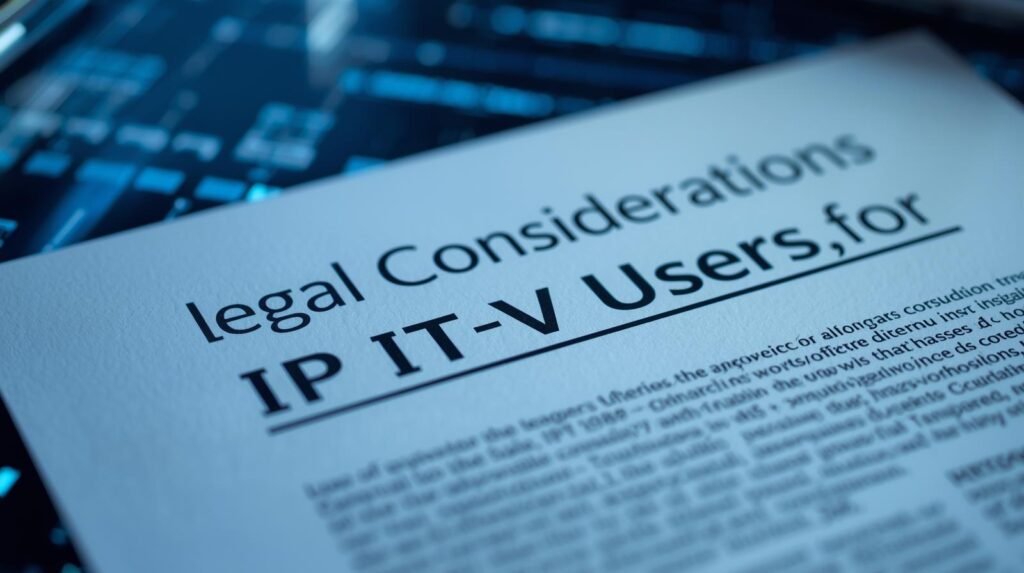What is IPTV?
How IPTV differs from cable / satellite
IPTV Legal Considerations delivers TV channels and on-demand video over IP networks instead of via coax/satellite signals. That makes it flexible and cheap to deploy — which is why both legitimate services (e.g., licensed streaming bundles) and pirate operators use the same basic tech.
Common IPTV setups (apps, boxes, subscription services)
You’ll see: official apps from broadcasters, paid cloud-based IPTV providers (with licences), and third-party “IPTV services” sold via websites, Telegram/WhatsApp groups or on pre-configured streaming boxes. The latter are the area with the most legal risk.
When is IPTV legal?
Licensed providers and legal IPTV
If a service has licensing agreements with content owners and transparently discloses those rights, it’s legal. Legitimate IPTV providers publish company details, terms, and accepted payment methods — and they pay for rights. Always look for that documentation.
Grey-area services vs clearly illegal services
Grey-area services might aggregate free, geo-licensed content or rely on complex reseller chains. Clearly illegal services re-stream pay channels (sports, premium cinema) without permission or sell “lifetime” access for suspiciously low prices. Those are the ones flagged by enforcement agencies.
Core risks for IPTV Legal Considerations
Copyright infringement (civil & criminal)
Streaming copyrighted material without authorization can trigger civil claims for damages. In many jurisdictions rights-holders also pursue criminal prosecutions, especially against commercial suppliers. Recent law changes have closed gaps around streaming so large-scale operators can face serious penalties.
Anti-circumvention and device trafficking rules
In some countries, laws prohibit trafficking in devices or software meant to circumvent pay protections (anti-circumvention). That means selling modified boxes or apps designed to bypass encryption can be an independent offence.
Consumer protection, scams and fraud
Many pirate services collect payment, then disappear; others bundle malware or harvest personal/financial data. Beyond legal risk, you may lose money and expose yourself to identity theft. Anti-piracy groups and police regularly warn about these hazards.
Jurisdiction matters: UK, US, EU (snapshot)
UK: illicit streaming devices & enforcement
UK guidance says devices are legal when used for legitimate free content, but become illegal once adapted to stream illicit subscription content. The UK has actively pursued sellers and resellers of “dodgy boxes,” with police and anti-piracy groups issuing prosecutions and penalties.
US: DMCA and the Protecting Lawful Streaming Act
U.S. law combines the DMCA’s anti-circumvention rules (17 U.S.C. §1201) with the Protecting Lawful Streaming Act, which makes large-scale commercial streaming piracy a felony. The Act is aimed at operators rather than casual viewers — but it raises the stakes for anyone running or reselling pirate services.
EU: cross-border enforcement and Europol actions
European agencies (including Europol) and the EUIPO have reported large illegal IPTV networks and coordinated takedowns. Rights-holders work across borders to seize servers, domains and crypto proceeds — showing that pirate IPTV is treated as organised commercial crime in many EU states.
How rights-holders and law enforcement act

Criminal prosecutions and sentencing examples
Recent high-profile cases show jail sentences, confiscation of proceeds and heavy fines for operators. Enforcement often targets the commercial ecosystem — hosts, resellers, and sellers of pre-loaded devices. These actions are growing in scale and coordination internationally.
Civil suits, injunctions and account closures
Rights-holders file civil suits to claim damages and obtain injunctions (site/domain takedowns). Platforms that facilitate payments or hosting may be compelled to cooperate, and ISPs sometimes receive blocking orders. Expect civil pressure long before criminal charges.
How to spot a legitimate IPTV provider
Checks that matter
- Company registration, full contact details, and public licensing statements.
- Transparent pricing and standard payment processors (no pressure to pay crypto-only).
- App availability in official app stores (Google Play, Apple App Store, Amazon) and positive independent reviews.
Red flags
- “Lifetime” subscriptions at rock-bottom prices.
- Sellers active only in Telegram/WhatsApp with anonymous crypto wallets.
- Pre-loaded devices sold as “premium” for tiny yearly fees.
Privacy & cybersecurity risks from pirate IPTV
Malware on modified boxes and rogue apps
Illicit IPTV apps and pre-configured boxes are a vector for Android malware and trojans that request excessive permissions, steal credentials, or drain crypto wallets. Security researchers and police have documented active campaigns that disguise malware as IPTV Legal Considerations or VPN apps. Don’t install unknown APKs.
Payment fraud and identity theft
Illicit services frequently ask for limited verification and non-refundable payments. Stolen card data and phishing schemes are common; consumers who use pirate services report higher rates of financial fraud.
Practical steps to stay legal and safe
Check licences, read T&Cs, prefer official apps
Before subscribing: look for licensing statements, company registration, and presence on official app stores. If you can’t find a provider’s legal paperwork and IPTV Legal Considerations, assume the service is risky.
Keep devices updated and avoid sideloading shady apps
Use only vetted apps from official stores, keep your OS updated, and run reputable antivirus/antimalware on devices where possible. Avoid “fully loaded” sticks and unknown APKs.
If you’ve already used a shady IPTV service
Minimize harm
If you used a suspect service: change passwords, check bank statements, alert your bank to suspicious charges, and run security scans on devices. Stop automatic payments and consider disputing fraudulent charges.
Legal options
If you receive a takedown notice or legal correspondence, don’t ignore it. Seek local legal advice; many notices are civil and can be settled or defended depending on facts. Document payments and communications with the provider.
Risks of selling or running IPTV services
Criminal liability for operators and resellers
Running, reselling or materially supporting a pirate IPTV service can lead to criminal charges, large fines, asset seizure and imprisonment in many jurisdictions. Law enforcement is prioritizing commercial networks and those profiting from piracy. Don’t get involved in reselling “dodgy boxes.”
Recommendations for content consumers
- Use licensed services or free trail official streams.
- If a deal looks too good to be true, it probably is.
- Protect your devices, cards and personal data.
- When in doubt, check rights-holder sites (broadcasters, leagues) for official streaming partners.
Conclusion
IPTV Legal Considerations — but legality hinges on licences and how content is acquired and redistributed. The global trend is clear: authorities and rights-holders are stepping up enforcement against commercial pirate IPTV networks, and consumers who buy or install unverified services risk civil claims, potential criminal exposure in some contexts, and serious cybersecurity harms. Be skeptical, do the licence checks, and choose official routes to watch premium content — it’s safer for your wallet, your privacy, and your legal peace of mind.
FAQs
- Is it illegal to watch IPTV on my TV if someone else installed it?
Watching streams is legally complex and varies by jurisdiction; many laws focus on operators, but accessing paid content without permission can create civil exposure and sometimes criminal risk. If the service is clearly unlicensed, stop using it and use legal alternatives. - Can I get in trouble for buying a cheap “lifetime” IPTV subscription?
Yes — these offers are often red flags for unlicensed services. At minimum you risk losing money and exposure to malware; at worst, resellers/operators (and sometimes persistent users in certain cases) may face enforcement. - Are VPNs safe to use with IPTV?
VPNs can improve privacy, but they don’t legalize piracy. Using a VPN to conceal illegal activity can worsen legal exposure in some jurisdictions. Use VPNs for legitimate privacy needs only and don’t rely on them to mask illegal streaming. - What should I do if my pre-loaded box stops working?
Stop using it, disconnect it, scan for malware, change passwords for accounts you used, and contact your bank if you paid with a card. Consider resetting devices to factory settings and only install official store apps. - Where can I verify if an IPTVUK provider is licensed?
Check the provider’s website for licensing disclosures, search rights-holders’ (broadcasters/leagues) official partner lists, and look for presence in official app stores and reputable reviews. If licensing info is absent or vague — steer clear.
